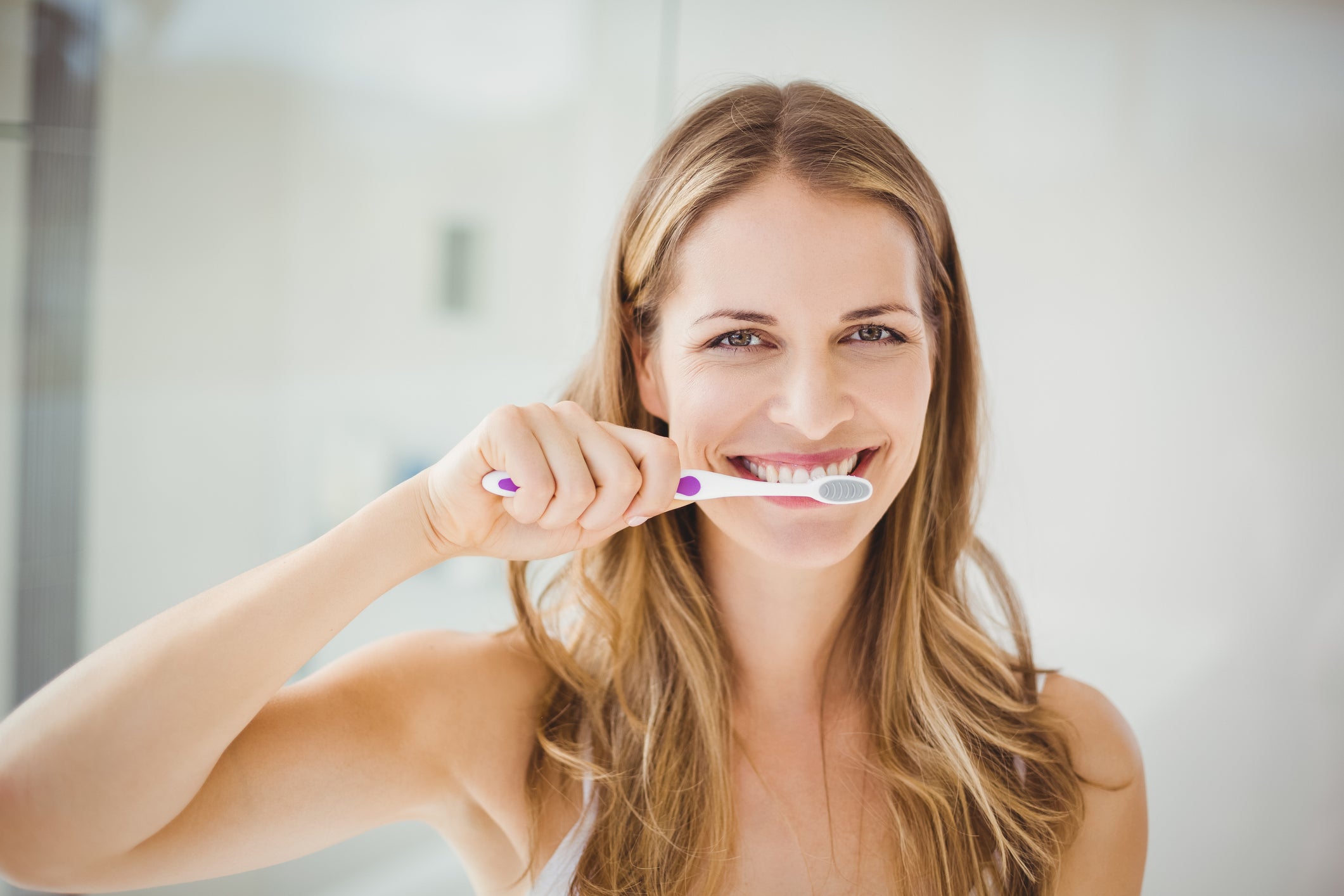-
How Chronic Illnesses Can Affect Oral Health
 Woman taking care of dental health by brushing teeth.
Woman taking care of dental health by brushing teeth.Oral Health and Overall Health
Did you know that the health of your mouth and the overall health of your body are connected? In fact, there is a bidirectional relationship between chronic illness and oral health. Some chronic diseases are directly associated with oral health issues, either causing or being caused by them. In other cases, there’s an indirect relationship, or shared risk factors. Let’s take a look at how chronic illnesses can affect oral health.
Chronic Diseases are Leading Causes of Death and Disability
Conditions like diabetes, heart disease, respiratory disease, cancers, and obesity can all be linked with poor oral health. Because oral health conditions are often chronic, they can happen alongside other chronic conditions. Unfortunately, people with more than one chronic condition tend to have worse long-term health outcomes than those who only have one chronic condition. Prevention is the key to good health, and maintaining good oral health care can help prevent chronic diseases or improve the outcome for those who suffer from them.
Preventing Gum Disease Can Improve Health
Gum disease is very common, affecting about 75 percent of adults in the United States. If left untreated, gum disease can advance and increase the risk of serious health issues, like diabetes, heart disease/stroke, lupus, oral cancer, organ transplant, and rheumatoid arthritis. Fortunately, when detected early, gum disease can be reversed through good oral hygiene and regular dental care.
How Different Conditions are Connected
- Diabetes, periodontal disease, and tooth decay are interconnected. Though more research is needed, there is evidence to suggest that periodontal disease and tooth decay can exacerbate type 2 and gestational diabetes. This probably occurs because these conditions increase inflammation and blood sugar levels. By the same token, people who have diabetes are at higher risk of infections that can cause tooth decay and periodontal disease.
- Oral health issues may be associated with heart disease. Studies show that periodontal disease and tooth decay may increase a person’s risk of heart disease, or worsen existing heart conditions, by causing inflammation and damaging blood vessels.
- Tooth decay and periodontal disease may be associated with respiratory disease. There are studies that suggest that by causing an increase in bacteria, periodontal disease and tooth decay can increase the risk of respiratory conditions, including emphysema, pneumonia, and COPD, due to bacteria from the mouth colonizing in the respiratory tract. People at highest risk include older people, those who wear dentures, and people with decreased immune system function.
- Periodontal disease and tooth decay may be linked to some cancers. Even after controlling for other risk factors, like smoking and diet, there is evidence to suggest that oral health problems may be connected to cancers like lung, pancreatic, and head/neck cancers. In one study, a 35 percent increased risk for blood cancer and 21 percent increased risk for cancer in general for men with periodontal disease, and another suggests that there is also a 63 percent increased risk of pancreatic cancer. Still another study suggests a 43 percent higher risk of esophageal cancer and a 52 percent higher risk of stomach cancer for those with periodontal disease, as compared to people with healthy gums.
- Obesity may increase the risk of oral health issues. The result of preliminary research on obesity and oral health speculates that secretions from adipose tissue increase the risk of inflammation, decreasing immunity as well as blood flow to the gums.
Talk to Your Dentist About Your Medications
Sometimes, the drugs prescribed for chronic illnesses can cause side effects that impact their oral health. For instance, swollen and bleeding gums, along with dry mouth can be side effects of medications for hypertension and heart conditions. Some drugs for high blood pressure can cause gum overgrowth, which can lead to decay and progressive gum disease. Because inflamed gums bleed easily, there is also a risk for ulceration and soreness. Other medications for hypertension can reduce saliva production, putting patients at risk for dry mouth and tooth decay. Heart medications like anticoagulants and blood thinners can raise a patient’s risk for prolonged bleeding, and can cause gums to bleed during brushing. There is also a risk, with these medications, of post-extraction bleeding or bleeding during cleaning. Your dentist might want to talk to your doctor about changing your medication.
Partner with Park 56 for a Healthy Mouth
If you’re looking for a dentist in New York, why not choose the dentist voted best in the city? At Park 56 Dental Group, we offer pediatric, prosthodontics, endodontics, oral surgery, Invisalign®, emergency, and sedation dentistry, all at the highest level of treatment. We serve the Midtown, Central Park, Upper East Side, Park Avenue, and all surrounding Manhattan and New York areas, with a patient-centered practice that has hours to fit your schedule. Schedule your complimentary consultation today by contacting us online or calling us at (212) 826-2322.
-
Preventing Dental Emergencies: Tips and Tricks to Keep Your Teeth Safe

Man taking care of teeth to prevent dental emergencies.
Dental Emergencies Are a Problem
When you have a dental emergency, it’s more than just inconvenient, it’s also traumatic. Painful and stressful, accidents can lead to hours at the emergency dentist and, in some cases, permanent tooth loss or severe gum bleeding. While there’s no way to prevent accidents completely, there are a few steps you can take to avoid most dental emergencies.
Your Dentist is Your Ally
Regular dental visits can help keep your teeth healthy and strong, catching problems before they become emergencies. What’s more, your dentist can recommend measures like sealants to protect your teeth from decay or an oral appliance to guard against bruxism. See your dentist twice a year for preventive care and a cleaning. Being proactive about preventive dental care can be much less costly and stressful in the long run.
Tips for Keeping Your Teeth Safe
- Practice good dental hygiene. At home, brush twice a day, floss at least once, and use mouthwash. Keeping your teeth clean can help prevent cavities, gum disease, cracks, fractures, and infections. Having your teeth deep cleaned at the dentist’s office twice a year gives added protection.
- Eat a tooth-strengthening diet. Eat a nutrient-dense diet, taking care to eat foods like leafy greens, fresh fruits and vegetables, and calcium-rich foods. Limit consumption of processed foods and sugary sweets, which can cause plaque buildup and feed the bacteria that cause tooth decay.
- Protect your teeth during sports. If you participate in sports, talk to your dentist about getting a custom-made mouthguard. This can make a big difference in keeping your teeth from being knocked out or damaged. You might also want a mouthguard to wear at night, to prevent teeth grinding.
- Manage your stress. Stress is bad for your whole body, and it can damage your teeth. People who are stressed may absentmindedly chew on hard things, and stress can cause people to grind their teeth. Embrace techniques like mindfulness, practice yoga, or find other healthy ways to manage your stress.
- Remember that teeth are not tools. We’ve all used our teeth for something we shouldn’t from time to time, when we can’t find the scissors, or the bottle opener is in another room. It could be fine, but then on the other hand, it only takes once for a tooth to crack. The convenience of not having to rummage through a drawer or ask for help is not worth risking your teeth.
- Don’t hesitate to seek dental care. Don’t let a dental emergency get out of hand. If you have a toothache, seek treatment as quickly as possible. Pain is an indication that something is not right, and getting treatment quickly can mean the difference between a routine procedure and serious oral surgery.
Park 56 is Here for Your Emergencies
If you’re looking for a dentist in New York, why not choose the dentist voted best in the city? At Park 56 Dental Group, we offer pediatric, prosthodontics, endodontics, oral surgery, Invisalign®, emergency, and sedation dentistry, all at the highest level of treatment. We serve the Midtown, Central Park, Upper East Side, Park Avenue, and all surrounding Manhattan and New York areas, with a patient-centered practice that has hours to fit your schedule. Schedule your complimentary consultation today by contacting us online or calling us at (212) 826-2322.
-
How Your Teeth Can Affect Your Sleep Quality

How is the quality of your sleep?
Sleep is important to our health in many ways, and a lack of it can diminish our concentration, leave us fatigued, and cause headaches. You may be suffering from broken sleep and not even know it, but your dentist can spot clues of sleep disturbance by just examining your mouth. How are oral health and sleep connected? Read on to learn the links between poor dental health and poor sleep.
The Sleep-Mouth Connection
- Periodontal disease can be exacerbated by poor sleep. That’s because poor sleep leads to inflammation in the body that impacts the health of your gums. By the same token, painful tooth and gum infections can keep you awake, creating a vicious cycle.
- Bruxism, grinding or clenching your teeth, can disrupt your sleep. It can also damage your teeth and lead to problems with your jaw or bite. To reduce bruxism, reduce stress, and create a relaxing bedtime routine.
- Another stress-related sleep disruptor is the presence of canker sores. These can be caused by anxiety and stress, and can make it hard to sleep.
- Insomnia can contribute to dry mouth. When you’re awake in the night, the amount of saliva in your mouth can be reduced. This can lead to dry mouth, which increases the number of bacteria in your mouth and contributes to tooth decay, as well as bad breath. Dry mouth, in turn, can be uncomfortable and cause sleeplessness.
- Sleep apnea starts with trouble breathing. It can cause snoring and interfere with a person’s ability to get quality sleep. It can also lead to temporomandibular joint (TMJ) issues, which can cause more restlessness.
Improving Your Oral Health and Your Sleep
What can you do to fix these issues, have a healthy mouth, and get a good night’s sleep? Start with good oral hygiene, brushing twice a day and flossing daily, to prevent plaque buildup and reduce your risk of gum disease and tooth decay. Follow up with a rinse, for extra protection. Then talk to your dentist about issues that may be affecting your sleep. You can get protective appliances to keep you from grinding your teeth, a night guard for sleeping, and a less noticeable appliance to wear during the day. Your dentist can also help you find solutions for sleep apnea, including custom-made oral sleep appliances.
Partner with Park 56 to Protect Your Teeth
If you’re looking for a dentist in New York, why not choose the dentist voted best in the city? At Park 56 Dental Group, we offer pediatric, prosthodontics, endodontics, oral surgery, Invisalign®, emergency, and sedation dentistry, all at the highest level of treatment. We serve the Midtown, Central Park, Upper East Side, Park Avenue, and all surrounding Manhattan and New York areas, with a patient-centered practice that has hours to fit your schedule. Schedule your complimentary consultation today by contacting us online or calling us at (212) 826-2322.
-
Foods that Naturally Help Prevent Cavities

Healthy food for healthy teeth.
Avoiding Cavities
You have heard since childhood that eating too many sugary sweets will give you cavities. As an adult, you might even be aware that simple carbs, dried fruit, and acidic foods can all lead to the formation of cavities. What you may not know, though, is that you can be proactive in what you eat, and consume foods that actually prevent cavities instead of just avoiding foods. Read on- we’ve got the scoop on eating foods that are good for your teeth.
Healing Cavities
If you think about the human body, it’s pretty amazing, in the ways it heals itself. Our immune systems rush to repair damage caused by a wound or injury, which is remarkable. Did you know that the mouth can heal itself, too? Saliva helps remineralize your teeth and stop tooth decay in the early stages. However, as with other part of the body, the mouth’s healing process requires the support of the right vitamins and minerals. To heal cavities before they take hold, eat foods rich in the following nutrients:
- Calcium
- Vitamin D
- Vitamin K2
- Magnesium
- Phosphorus
- Xylitol
Understanding Cavities
Do you know how cavities form? It’s a complex process, and can take days, weeks, or even months. First, plaque forms when bacteria and food particles coat the surface of the tooth and are allowed to remain there. Plaque buildup increases as the plaque is fed by carbohydrates like sugars or bread, and as this happens, the plaque excretes acids that wear away at the tooth. If this is allowed to continue, the acid results in cavities, which are holes in the teeth. Once you have cavities, it makes it easier to spread infection and harder to maintain dental hygiene, creating a vicious cycle. That’s why it’s so important to fill your diet with foods that counteract cavities.
Foods that Help Prevent Cavities
While simple starches fuel cavity-causing bacteria, certain foods and drinks strengthen your teeth and lower the risk of cavities by reducing unhealthy bacteria in your mouth. Eggs and dairy provide vitamin D, and yogurt boosts immunity with probiotics. Another benefit of dairy foods, like milk, cheese, and yogurt, is that they’re rich in calcium, which strengthens bones and teeth. Other calcium rich foods include canned sardines and salmon (with edible bones), almonds, leafy greens, broccoli, seeds, beans and lentils, rhubarb, figs, and amaranth. Vitamin K2 helps the body move calcium from the bloodstream to bones and teeth, and this nutrient can be found in beef or chicken liver, chicken breast, butter, sauerkraut, ground beef, and salami. Beans are rich in phosphate, which helps remineralize teeth, and another nutrient that helps with this process is potassium, found in avocados. The magnesium you need to support healthy teeth is found in leafy greens, nuts and seeds, whole grains, quinoa, soy, tofu, and avocado, and blackstrap molasses. Sweet potatoes are very high in vitamin A, which promotes salivary function and balances oral pH and reduces cavity-causing bacteria. Tea also reduces harmful bacteria and drinking it can prevent cavities, but it’s also important to drink plenty of water, to rinse debris from your teeth throughout the day.
Providing Support to Your Teeth
Remineralizing your teeth requires preventing tooth decay from disrupting the natural remineralization process. In addition to a healthy diet, there are some other best practices that can help:
- Brush your teeth twice a day. Using gentle circles angled at your gums, brush with a soft-bristled toothbrush to help remove harmful bacteria from your teeth.
- Floss at least once a day. Floss with string floss or use an irrigator. Better yet, use both, to reduce double the plaque buildup.
- Use good toothpaste. High-quality fluoride toothpaste, approved by the American Dental Association (ADA), can help with remineralization.
- See your dentist regularly. Visiting your dentist twice a year for a deep cleaning and an exam can help catch oral health issues before they become problems.
Partner with Park 56 to Protect Your Teeth
If you’re looking for a dentist in New York, why not choose the dentist voted best in the city? At Park 56 Dental Group, we offer pediatric, prosthodontics, endodontics, oral surgery, Invisalign®, emergency, and sedation dentistry, all at the highest level of treatment. We serve the Midtown, Central Park, Upper East Side, Park Avenue, and all surrounding Manhattan and New York areas, with a patient-centered practice that has hours to fit your schedule. Schedule your complimentary consultation today by contacting us online or calling us at (212) 826-2322.
RECENT POSTS
categories
- Uncategorized
- Cosmetic Dentistry
- Veneers
- Healthier Teeth
- Teeth Whitening
- Dental Health
- Video
- Dental Emergencies
- Invisalign
- Dental Implants
- Root Canal
- Sedation Dentistry
- Infographic
- Dental Crowns and Bridges
- Dental Anxiety
- Gum Disease
- COVID-19
- Bad Breath
- New York Dentist
- Cut out sugar
- General Dentistry
- Oral Health
- Oral Cancer
- Dry Mouth
- Gum Health
- Toothache
- Dental Sealants
- Cavities



